‘Systemic racism’ at DePaul condemned by communication scholars nationwide in petition to administration
The statue of Father John Egan outside of DePaul’s Lincoln Park campus.
Eighty-five communication scholars from all corners of the country condemned DePaul for fostering a “toxic environment that threatens the health, wellbeing, livelihoods and lives of scholars of color” in a petition sent April 12 to the university’s upper administration and College of Communication deans.
“It is clear that DePaul’s College of Communication deploys practices and procedures that are aggressively hostile towards BIPOC faculty offering a clear example of how white supremacist and racist structures operate in higher education with impunity,” the petition reads.
The appeal points to the cases of Drs. Sydney Dillard and Lisa Calvente — both of whom filed discrimination lawsuits against the university in 2020 — as evidence of the need for urgent change to the way faculty of color are treated at DePaul. Dillard filed charges claiming racial and disability discrimination, and Calvente sued on the grounds on racial discrimination, retaliation and breach of contract in regards to her denial of tenure.
“It is clear from the evidence that the standards, processes, and procedures in DePaul’s College of Communication are shifted and manipulated to work to the advantage of white faculty,” the petition reads. “Organizational procedures, codes of conduct, and even federal laws are broken to allow white faculty to advance, while preventing Black and Brown faculty from advancing. BIPOC faculty face age-old tactics of suspicion and surveillance that serve to gaslight them and stand in the way of their careers.”
Shaunak Sastry, an associate professor at the University of Cincinnati and one of the petitioners, told The DePaulia that the petitioners became aware of Calvente’s case due to its high profile in academic circles and of Dillard’s case through The DePaulia’s reporting.
“Universities are interesting spaces, because in themselves, they can be kind of closed systems, but at the same time, universities are also related to each other through professional associations, so there are these connections,” Sastry said. “For us, it was a matter of thinking about what actions reflect an accountability not just to the university stakeholders, but to the larger academic community within which this university belongs.”
The petition calls on the university to take three steps: acknowledge that DePaul has a “systemic problem of racial harassment” of its faculty of color, demonstrate a commitment to dismantling those structures and act immediately to “support the health and well-being of BIPOC faculty in the face of these racial attacks.”
Each step is further broken down into direct actions requested by the petitioners, starting with the resignation of both interim Provost Salma Ghanem and Alexandra Murphy, acting dean of the College of Communication.
“We need strong and bold and courageous leadership, leadership that is able to stand up and stand against the status quo, because power always flows in the direction of power,” Rebecca de Souza, another petitioner and professor at the University of Minnesota Duluth, told The DePaulia. “…So this was our way of saying, ‘You, the two of you, were leaders during the time that this happened.’ And that’s why we pointed to these two individuals in particular. It’s not our way of saying ‘You intended to do this,’ but it’s our way of saying, ‘You were at the helm when this happened.’ And as leadership, it’s sort of our responsibility — wherever we are — to intervene.”
The petitioners are requesting a written response from the university by April 26.
In response to The DePaulia’s request for comment, Murphy said the College of Communication has worked to advance Diversity, Equity and Inclusion efforts through an action plan two years in the making. She explained that education — like reading groups, workshops and trainings — examining and revising policies and practices and providing spaces for feedback are key components of the plan.
“I completely agree that we must always interrogate and challenge the dominant systems and practices by which we operate, and universities are no exception,” Murphy said.
Russell Dorn, a spokesperson for DePaul, said the university cannot address questions about personnel matters or active litigation but pointed to steps the university has taken this year to address structural racism, including offering workshops, reviewing policies and requiring implicit bias search training for faculty and staff searches.
“As it is for all of DePaul’s schools and colleges, this work has been, and will continue to be, a priority for the College of Communication,” Dorn said.
Ghanem did not respond to The DePaulia’s request for comment.
Other recipients of the petition include President A. Gabriel Esteban, the other three deans of the College of Communication, the university’s four vice presidents and the associate provost for Diversity, Equity and Inclusion.
Copied on the email are Gerald Beeson, chair of the Board of Trustees; Valerie Johnson, chair of the Faculty Council’s Equity, Inclusion and Diversity committee and five presidents or executive directors of prominent national communication associations.
“Rather than treating faculty of color as deficient and problematic, DePaul needs to turn a mirror to itself and inquire about those factors that give rise to these lawsuits,” Johnson, who was copied on the email, said in response to The DePaulia’s request for comment. “We need to ask what’s going on in the College of Communication. Why aren’t women of color faculty thriving there? Rather than adopting a deficit orientation toward faculty, staff and students of color, we might be better served by examining institutional deficits. The administration has committed to dismantling structural inequalities, but we can’t dismantle what we are unwilling to face.”
Ramsay, one of the communication deans, said that while she is not a member of the faculty body, she hopes the petition will motivate action.
“My hope is that the petition and recent legal action has inspired the college and university to examine their policies and practices for fairness and equitable treatment of its faculty of color,” she said in a comment to The DePaulia.
The petition was started on March 22 and shared in the Facebook group “Communication Scholars for Transformation,” a space where thousands of communication scholars “interested in transforming the discipline and being more engaged in issues of diversity, equity and inclusion” share ideas, according to Sastry.
“As external agents — people outside of DePaul — I think that is one of the smallest things we could do, is to write a letter — asking, requesting, using the language of demands,” de Souza said.
“What’s happening at DePaul is very similar to what we’re seeing on our own campuses,” she added. “DePaul is not unique. I wish it was the only university doing this, but it’s not.”
Communication scholars from more than 50 American universities have signed the petition, along with one professor from Bangladesh and another from New Zealand.
“We hoped that the brutal murder of George Floyd would result in transformational changes across universities, but this has not been the case,” the petition reads. “We demand that you ‘get your knee off our necks.’”


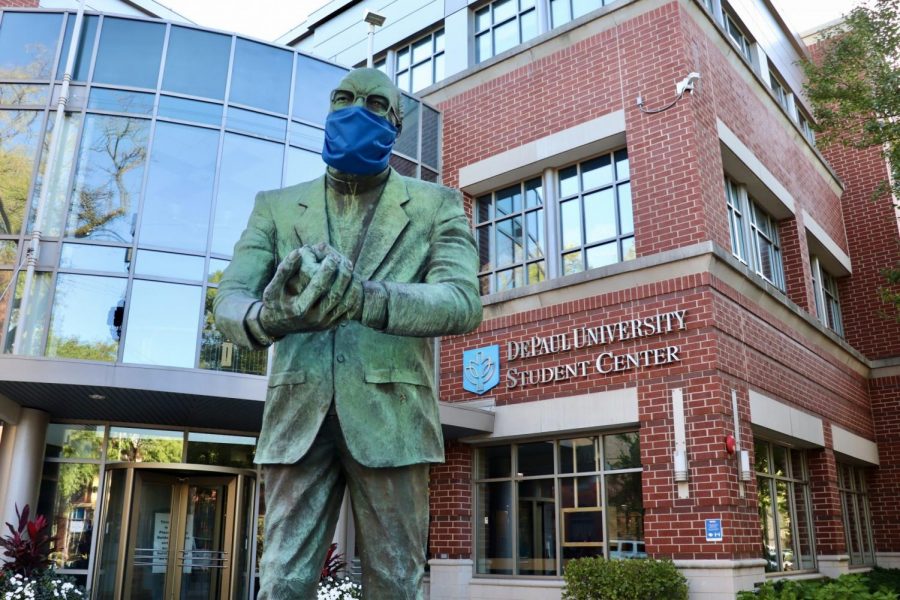

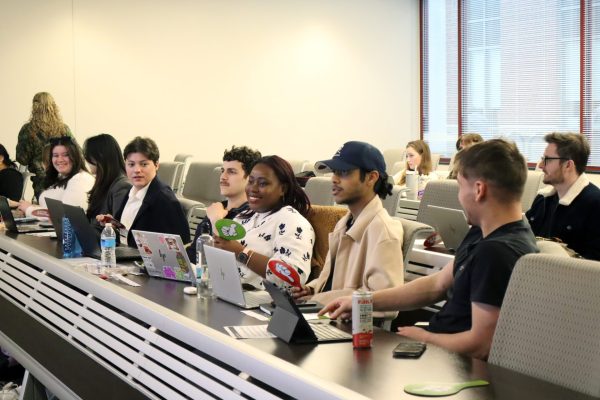
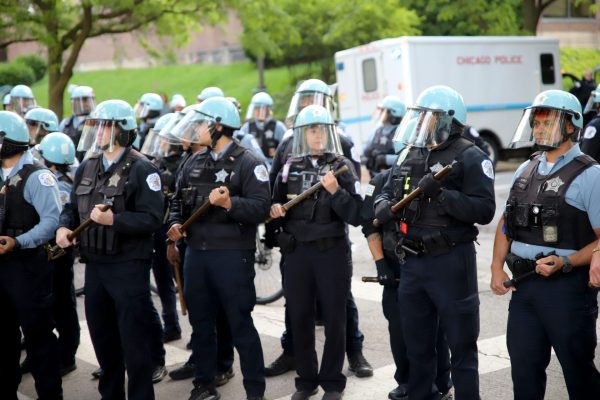

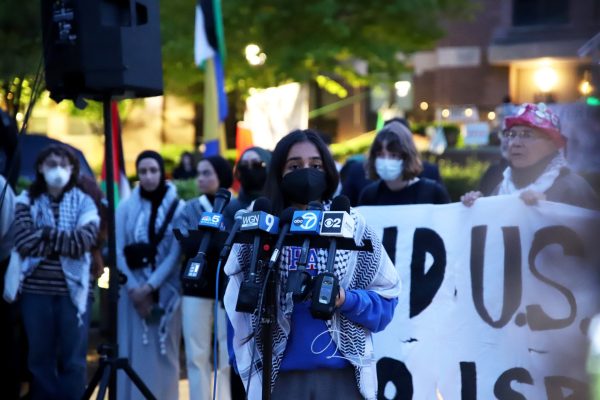




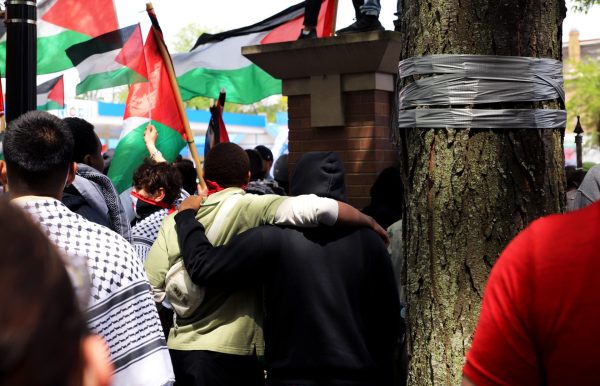
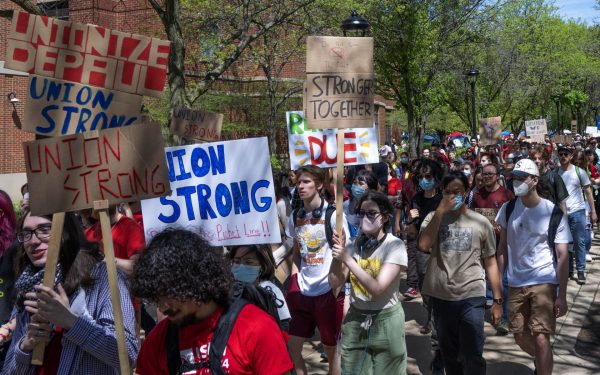
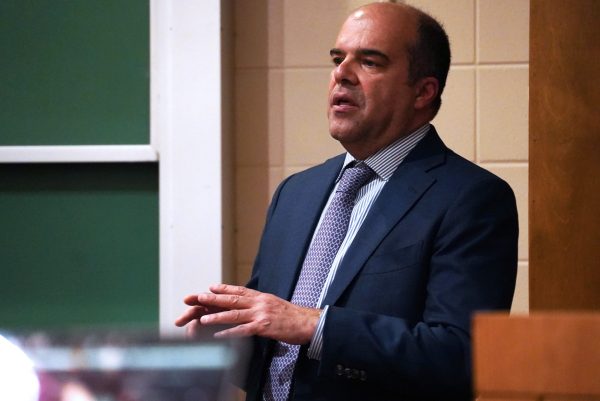


Bill MacKenzie • May 13, 2021 at 8:03 pm
As with so many “pile on” petitions in academic circles and on Change.org, I’d be willing to wager that few of the signers have really studied and understand the DePaul situation . This article notes that “Communication scholars from more than 50 American universities have signed the petition, along with one professor from Bangladesh and another from New Zealand.” Why should DePaul’s policies and practices be guided by the whims of many people with absolutely no connection to the school? On what authority do these people demand that DePaul acknowledge it has a “systemic problem of racial harassment” of its faculty of color or that both interim Provost Salma Ghanem and Alexandra Murphy, acting dean of the College of Communication, resign.
John Jones • Apr 29, 2021 at 3:56 pm
“We hoped that the brutal murder of George Floyd would result in transformational changes across universities, but this has not been the case,” the petition reads. “We demand that you ‘get your knee off our necks.’”
Yeah, well, so much for “transformational change” and all the other psychobabble coming from the mouths of would be members of the American Sociological Association. I’m less concerned with George Floyd and other princes of wise decisionmaking, right now at least, than I am with the likes of Demond Gaudy and Marion Lewis, two human pieces of excrement that murdered an innocent and beautiful 7 year old girl in a McDonald’s parking lot, at Roosevelt and Kedzie, five miles from DePaul, allegedly because her father critically reviewed one of these cockroach’s attempts to become the next Kanye West. Where’s the outrage from these clueless quasi intellects and busybodies using nebulous terms that have been repeated, in one form or another form the Woke Left so frequently that they are completely meaningless.
Communication. Scholars. DePaul. Serious Scholarship. Oxymorons both. Speaking of morons….